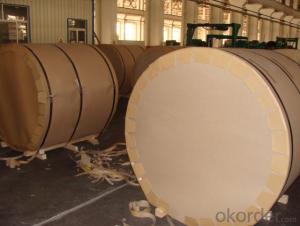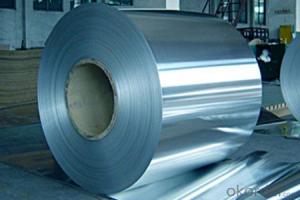Mill Finished Aluminum Coils 1xxx
- Loading Port:
- China Main Port
- Payment Terms:
- TT or LC
- Min Order Qty:
- 5 m.t.
- Supply Capability:
- 100000 m.t./month
OKorder Service Pledge
OKorder Financial Service
You Might Also Like
1.Structure of Mill Finished Aluminum Coils 1xxx Description
Mill Finished Aluminum Coils 1xxx has great ductility, heat conductivity, anti-corrosion and moisture resistance properties.Mill Finished Aluminum Coils 1xxx is widely used in the filed of Construction /Furniture/decorate/industry,etc.
2.Main Features of the Mill Finished Aluminum Coils 1xxx
• High weather resistance
• Anti scratch anticorrosion
• Subtle edges and elegant appearance
3.Mill Finished Aluminum Coils 1xxx Images
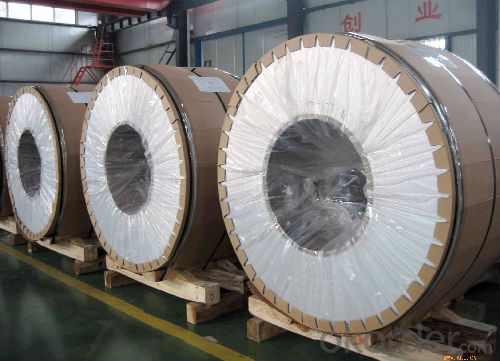
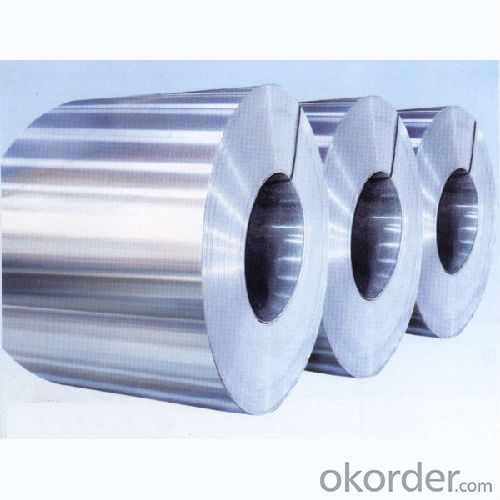
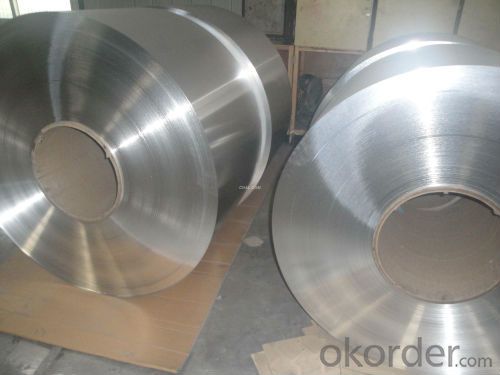
4.Mill Finished Aluminum Coils 1xxx Specification
Alloy | AA1xxx (AA1050, AA1060, AA1100 etc.) |
Temper | O\H12\H14\H16\H18\H22\H24\H26 |
Thickness | 0.2mm -- 100mm |
Width | 30mm -- 1700mm |
Standard | GB/T 3880-2006 |
5. FAQ of Mill Finished Aluminum Coils 1xxx
A.What is the package?
On wooden pallets in containers.
B.When will you deliver the products?
The products will be delivered within 35 days after receiving original L/C or advanced payment.
- Q:A bit of a question for the 1911 experts roaming around here. Per-say someone, who knew their way around a 1911 built one on an aluminum frame. To top it all off, if the finished gun were to be chambered in .38 super... how long would this combination last? I've heard horror stories about aluminum frames, and then I've heard some wonderful things... this question was to see if anyone had ever thought about/done this sort of thing before. Something tells me that Aluminum + .38 super wouldn't last too long... Most informative answer gets the ten point prize as usual.
- Aluminum might be corrosive resistant but it is softer than a stainless steel frame. It might be possible to shoot .38 super regular loads through it but any .38 super + P might cause a catastrophic failure of the weapon. Just my opinion.
- Q:Can aluminum coils be used for radiation shielding?
- Yes, aluminum coils can be used for radiation shielding. Aluminum is a commonly used material for radiation shielding due to its high atomic number and density, making it effective at absorbing and scattering radiation. Aluminum can effectively shield against a wide range of radiation types, including gamma rays and X-rays. Additionally, aluminum is a lightweight and malleable material, making it easy to work with and suitable for various applications where radiation shielding is required, such as in medical imaging, nuclear power plants, and aerospace industries.
- Q:Who knows the color coated aluminum roll, that is, roll coating manufacturers? Yes, let me know!
- Painted with the concept of roller you did not understand, did not know what you need.
- Q:What exactly happens in the reaction involving powdered aluminum and crushed iodine? I know that adding a few drops of water produces a lot of purple smoke and that it will flare up but what is the chemistry involved? And also, I know that the white residual left in the cup is Al2I6 but why is it acidic when water is added to it? It has a pH of between 1 and 2. What is the smoke that is produced and what causes the exothermic reaction?
- iodine is an oxidizer, a good taker of electrons Aluminum is a great loser of electrons you have a redox reaction happening where Al loses electrons to become Al+3 , and Iodine takes electrons to become I-1 iodide since the reaction is forming the most stable material Al2I6, the reaction must be exothermic, when products are more stable than reactants,... the excess energy must be released. it is the release of this heat that evaporates some of the iodine crystals into the purple iodine vapor Al2I6 does a hydrolysis reaction with water: Al2I6 in water -- Al(OH)3 3 HI the byproduct Al(OH)3 is stable not soluble (a very weak base) but the byproduct HI is a very strong acid what is the smoke? upon adding water? could be steam, the purple smoke was iodine vapor
- Q:Normal aluminum like you find in the ground, not the man made stuff
- As rowlfe said, aluminium does not exist free in nature. There are quite a number of minerals and compounds containing aluminum that are phosphorescent, though--there is a long list in the link below. The primary ore of aluminum is bauxite, but I don't think it is typically phosphorescent though it may be under certain circumstances. . Technically, aluminum is not man-made, so be careful using that term. All aluminum in existence is created in supernova explosions during star death. (This IS the Astronomy Space forum, after all.) All pure aluminum metal is *refined* by man, but the element itself isn't man-made. (There are some transuranic elements such as plutonium that do not exist in nature and have only been made by humans, so the point is relevant though perhaps not pertinent to your question. Aluminum isn't one of them, though.) . Edit: If you don't learn what you want here, you might consider reposting this question in the Geology section. That bunch probably knows more about minerals and such than the Astronomy Space crowd does.
- Q:Is anodized aluminum suitable for indefinite salt-water exposure or will it rust? Also note that it would be used for the hull of a boat (more like a platform), and if it is not suitable could you suggest another metal?
- Is Aluminium Rust Proof
- Q:Are aluminum coils compatible with different welding methods?
- Yes, aluminum coils are compatible with different welding methods. Aluminum is a versatile metal that can be welded using various techniques such as gas tungsten arc welding (GTAW), also known as TIG welding, and gas metal arc welding (GMAW), also known as MIG welding. These methods are commonly used for welding aluminum coils due to their ability to produce high-quality welds with good strength and appearance. TIG welding is particularly suitable for aluminum as it allows for precise control of heat input and provides excellent weld quality. It uses a non-consumable tungsten electrode and an inert gas such as argon to shield the weld zone from atmospheric contamination. MIG welding, on the other hand, is a faster process that uses a consumable wire electrode and a shielding gas to protect the weld pool. It is widely used in industrial applications due to its efficiency and ease of use. In addition to TIG and MIG welding, other methods such as laser welding and friction stir welding can also be used for aluminum coils, depending on the specific requirements of the application. It is important to note that proper preparation, including cleaning and surface treatment of the aluminum coils, is crucial for achieving successful welds. This ensures the removal of any contaminants or oxide layers that may negatively affect the welding process. Overall, aluminum coils are compatible with different welding methods, and the choice of technique depends on factors such as the desired weld quality, production requirements, and the skills and equipment available.
- Q:Can aluminum coils be used in the production of electronic devices?
- Yes, aluminum coils can be used in the production of electronic devices. Aluminum is a commonly used material in the electronics industry due to its excellent conductivity, lightweight nature, and resistance to corrosion. Aluminum coils are often utilized in various electronic components like transformers, inductors, and coils for power supply applications.
- Q:What is the hardness of aluminum coils?
- The hardness of aluminum coils can vary depending on factors such as the alloy used and the specific manufacturing process. However, in general, aluminum coils are known for their relatively low hardness compared to other metals.
- Q:What are the acoustic properties of buildings using aluminum coils?
- Various factors can influence the acoustic properties of buildings that utilize aluminum coils. These coils are commonly employed in the construction industry for purposes such as roofing, cladding, and insulation. In terms of acoustics, these properties can have both positive and negative effects on sound transmission within a building. One of the main advantages of using aluminum coils from an acoustic standpoint is their ability to act as a barrier that reflects sound waves. When installed correctly, they can help prevent sound from penetrating walls or ceilings, resulting in a reduction of external noise sources. This can be especially beneficial in areas with significant noise pollution, such as urban environments or locations near busy roads. Additionally, aluminum coils can contribute to the overall sound insulation of a building. Due to their material properties, they can provide a certain level of soundproofing, particularly when combined with other insulation materials. This can create a comfortable and quiet indoor environment, which can lead to improved concentration, productivity, and overall well-being for occupants. However, it is important to note that the acoustic properties of buildings using aluminum coils may also have limitations. Aluminum is a lightweight material compared to alternatives like concrete or brick, meaning it may not offer as much mass to block sound transmission. Therefore, in situations where high sound insulation is necessary, additional measures such as double glazing, acoustic seals, or thicker wall constructions may be required. Furthermore, the use of aluminum coils can also impact the sound reverberation within a space. Their smooth and reflective surface can cause sound waves to bounce off, resulting in increased echo and reverberation time. This can have a negative effect on speech intelligibility and acoustic comfort, particularly in larger open-plan areas or rooms with high ceilings. Overall, while aluminum coils can provide certain acoustic benefits such as sound reflection and insulation, it is crucial to consider the specific requirements of each building project. Consulting with acoustic engineers or professionals can help ensure that appropriate measures are taken to optimize the acoustic properties of buildings utilizing aluminum coils and address any potential limitations.
1. Manufacturer Overview |
|
|---|---|
| Location | |
| Year Established | |
| Annual Output Value | |
| Main Markets | |
| Company Certifications | |
2. Manufacturer Certificates |
|
|---|---|
| a) Certification Name | |
| Range | |
| Reference | |
| Validity Period | |
3. Manufacturer Capability |
|
|---|---|
| a)Trade Capacity | |
| Nearest Port | |
| Export Percentage | |
| No.of Employees in Trade Department | |
| Language Spoken: | |
| b)Factory Information | |
| Factory Size: | |
| No. of Production Lines | |
| Contract Manufacturing | |
| Product Price Range | |
Send your message to us
Mill Finished Aluminum Coils 1xxx
- Loading Port:
- China Main Port
- Payment Terms:
- TT or LC
- Min Order Qty:
- 5 m.t.
- Supply Capability:
- 100000 m.t./month
OKorder Service Pledge
OKorder Financial Service
Similar products
New products
Hot products
Related keywords
